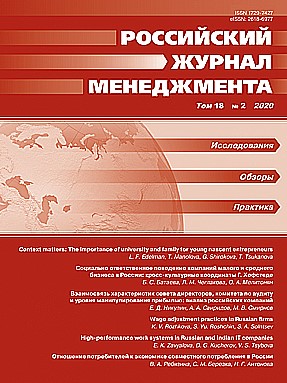Socially responsible behavior of SMEs in Russia: Cross-cultural coordinates of G. Hofstede
DOI:
https://doi.org/10.21638/spbu18.2020.202Abstract
In the course of research of companies’ responsible behavior, it is essential to consider an institutional environment which is largely influenced by the national culture. This paper presents an attempt to explore the responsible behavior and activities of Russian small and medium enterprises (SMEs) paying thorough attention to specific features of the national culture. Authors used the concept of G. Hofstede as a useful basis for an empirical measurement of responsible behavior. Empirical indicators and measurement scales are proposed to relate the responsible behavior of SMEs in Russia to five dimensions of culture offered by G. Hofstede. The responsible behavior of Russian SMEs was analyzed based on 61 interviews of owners and managers of Russian SMEs conducted in 2015 and 2017. It was concluded that features of SMEs’ responsible behavior almost completely meet the profile of Russian national culture defined by G. Hofstede's cross-cultural dimensions. Differences are identified in the dimensions of “power distance” and “femininity/masculinity”.
Keywords:
small and medium-sized businesses, entrepreneurship, socially responsible business, corporate social responsibility, national culture, dimensions of G. Hofstede, institutional theory
Downloads
References
REFERENCES IN LATIN ALPHABET
Translation of references in Russian into English
Downloads
Published
How to Cite
Issue
Section
License
Articles of the Russian Management Journal are open access distributed under the terms of the License Agreement with Saint Petersburg State University, which permits to the authors unrestricted distribution and self-archiving free of charge.





